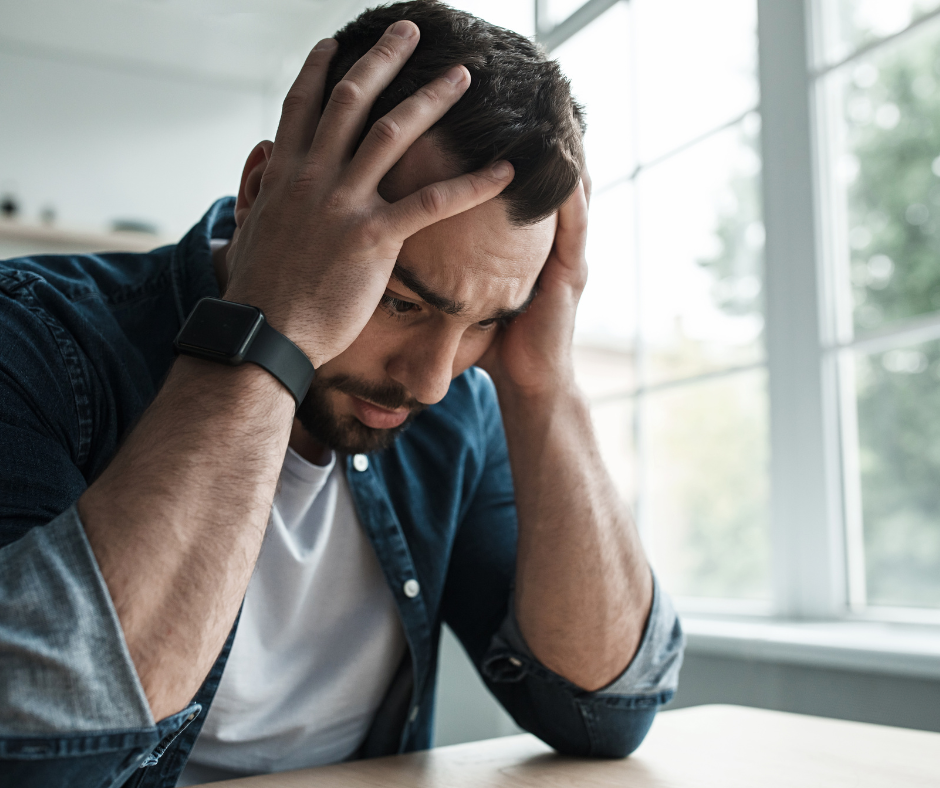Low Testosterone and Anxiety
Low Testosterone and Anxiety: Exploring the Connection and Finding Solutions
The balance of hormones in the human body is essential for physical and mental well-being. Testosterone, often recognized for its role in physical strength and vitality, also plays a significant role in emotional stability and mental health. For men, especially, a decline in testosterone levels—commonly known as Low T—can contribute to a wide range of challenges, including anxiety.
Anxiety, characterized by persistent worry, fear, and stress, can significantly affect quality of life. While it has many causes, hormonal imbalances like Low T are often overlooked as a contributing factor.
Understanding the connection between low testosterone and anxiety is a critical step toward finding effective solutions and regaining control over both physical and emotional health.

Understanding Low Testosterone
Testosterone is a vital hormone produced primarily in the testicles in men and in smaller amounts in women’s ovaries. It regulates key functions such as muscle growth, bone density, energy levels, and sexual health. However, its influence doesn’t stop there. Testosterone is intricately connected to mood, cognitive function, and the body’s ability to manage stress.
Testosterone levels naturally decline with age, starting in a man’s 30s and decreasing steadily thereafter. While this decline is normal, some men experience a more significant drop, leading to symptoms of Low T. Beyond age, factors such as chronic stress, poor diet, lack of sleep, and underlying health conditions can exacerbate this decline.
Symptoms of Low T often include fatigue, decreased libido, weight gain, and difficulty maintaining muscle mass. However, one of the most insidious and less-discussed effects of Low T is its impact on mental health, particularly anxiety.
What is Anxiety?
Anxiety is a common mental health condition characterized by feelings of excessive worry, fear, or unease. While occasional anxiety is a normal response to stress, chronic anxiety can interfere with daily life, affecting relationships, work, and overall well-being.
Anxiety disorders can take many forms, including generalized anxiety disorder (GAD), social anxiety, panic disorder, and phobias. Regardless of the type, anxiety often stems from a combination of genetic, environmental, and psychological factors.
Hormonal imbalances, including Low T, are increasingly recognized as a contributing factor to anxiety. The relationship between testosterone and mental health sheds light on how hormonal therapy could play a role in addressing this condition.
The Connection Between Low Testosterone and Anxiety
The link between low testosterone and anxiety is rooted in the hormone’s influence on the brain and nervous system. Testosterone interacts with neurotransmitters like serotonin and dopamine, which regulate mood, stress response, and emotional stability. When testosterone levels are low, these neurotransmitters may become imbalanced, increasing susceptibility to anxiety and other mood disorders.
Hormonal Imbalances and Neurotransmitters
Testosterone supports the production and activity of serotonin, often referred to as the “feel-good” neurotransmitter. Serotonin helps regulate mood and reduces feelings of stress and anxiety. When testosterone levels drop, serotonin production can decline, leading to heightened anxiety and emotional instability.
Similarly, testosterone influences dopamine, which is critical for motivation and reward processing. Low testosterone can disrupt dopamine pathways, contributing to feelings of apathy and a diminished ability to cope with stress.
The Role of Cortisol
Cortisol, the body’s primary stress hormone, often works in opposition to testosterone. Under normal circumstances, testosterone helps modulate cortisol levels, preventing them from rising too high during stressful situations. When testosterone levels are low, cortisol can remain elevated, exacerbating feelings of anxiety and stress.
Physical Symptoms and Emotional Impact
Low testosterone often leads to physical changes, such as fatigue, weight gain, and loss of muscle mass. These changes can affect self-esteem and confidence, creating a feedback loop that amplifies anxiety. For men, feelings of inadequacy or frustration tied to physical decline can further compound mental health challenges.
How Low Testosterone Manifests as Anxiety

The interplay between Low T and anxiety is complex, but understanding how hormonal imbalances manifest as emotional symptoms can provide valuable insights.
Persistent Worry and Restlessness
Men with Low T often report a sense of unease or persistent worry that feels disproportionate to their circumstances. This is likely due to the impact of hormonal changes on the brain’s stress response.
Difficulty Coping with Stress
Testosterone helps regulate the body’s stress response, making it easier to handle challenging situations. When levels are low, men may find themselves feeling overwhelmed by stressors that they previously managed with ease.
Mood Swings and Irritability
Low testosterone can lead to mood swings and irritability, often mistaken for personality changes. These shifts in mood are tied to the hormone’s influence on neurotransmitter activity.
Physical Symptoms That Trigger Emotional Distress
Symptoms like fatigue, insomnia, and reduced physical performance can create a sense of helplessness or loss of control, further fueling anxiety.
Addressing Low Testosterone and Anxiety
Fortunately, low testosterone and anxiety are treatable conditions. By addressing the underlying hormonal imbalance, many men experience significant improvements in their mental health and overall quality of life.
Testosterone Replacement Therapy (TRT)
Testosterone Replacement Therapy (TRT) is a medically supervised treatment designed to restore testosterone levels to a healthy range. Administered through injections, gels, patches, or pellets, TRT can alleviate the physical and emotional symptoms of Low T, including anxiety.
Studies have shown that TRT can improve mood, reduce anxiety, and enhance overall emotional resilience. By restoring hormonal balance, TRT addresses one of the root causes of anxiety, providing a more holistic approach to mental health treatment.
Lifestyle Modifications
While TRT is highly effective, incorporating healthy lifestyle changes can further support hormonal health and reduce anxiety.
- Exercise Regularly: Physical activity boosts testosterone production and releases endorphins, natural chemicals that improve mood and reduce stress. Resistance training and high-intensity workouts are particularly beneficial.
- Prioritize Sleep: Quality sleep is essential for testosterone production and mental health. Aim for 7–9 hours of uninterrupted rest each night.
- Eat a Balanced Diet: Include foods rich in vitamins and minerals like zinc and vitamin D, which support testosterone levels and overall health.
- Manage Stress: Practice mindfulness, meditation, or relaxation techniques to lower cortisol and enhance emotional resilience.
- Limit Alcohol and Avoid Smoking: Both can negatively impact testosterone levels and mental health.
Need a check-up or second opinion on your health?
Speak to a Licensed Clinician Today.
Seeking Professional Help
If you suspect that low testosterone is contributing to your anxiety, it’s important to consult a healthcare provider. A simple blood test can determine your hormone levels, and a comprehensive evaluation can help identify the best course of action.
Your healthcare provider may recommend TRT, lifestyle changes, or a combination of treatments tailored to your needs. Addressing both the physical and emotional aspects of Low T ensures a more effective and sustainable recovery.
Breaking the Stigma Around Men’s Mental Health
Men often face societal pressures to appear strong and resilient, making it difficult to acknowledge struggles with anxiety or hormonal imbalances. However, seeking help is a sign of strength, not weakness. Recognizing the connection between low testosterone and anxiety empowers men to take proactive steps toward better health.
By fostering open conversations about hormonal health and mental well-being, we can break down barriers and encourage more men to seek the care they deserve.
Final Thoughts: A Path to Balance and Vitality
Low testosterone and anxiety are interconnected challenges that can affect every aspect of life, from physical performance to emotional well-being. Understanding the role of hormones in mental health is key to finding effective solutions.
Testosterone Replacement Therapy, combined with healthy lifestyle changes, offers a path to balance and vitality. If you’re struggling with anxiety and suspect hormonal imbalances may be contributing, reach out to a trusted healthcare provider. Help is available, and taking the first step can lead to a healthier, more confident version of yourself.
Stay Informed: Subscribe to Our Newsletter
What Next?
You may also like…
- What Happens When You Stop TRT?
- Finding the Right Testosterone Therapy Clinic
- Does Insurance Cover Testosterone Therapy?
- Low Testosterone and Anxiety
- 6 Benefits of HGH Therapy
- Strength and Vitality for First Responders
- Clomid Therapy for Male Fertility
- Improving Type 2 Diabetes with HRT
- Understanding High Blood Pressure
- DNA Testing for Weight Loss
Thanks for Reading: Share with Your Friends!
NEW PATIENT SPECIAL
$9/UNIT BOTOX
*On first 20 units of Botox
Contact Us
- 1400 Buford Hwy NE
- Sugar Hill, GA 30518
- Suite K 2
- (678) 892-9230
